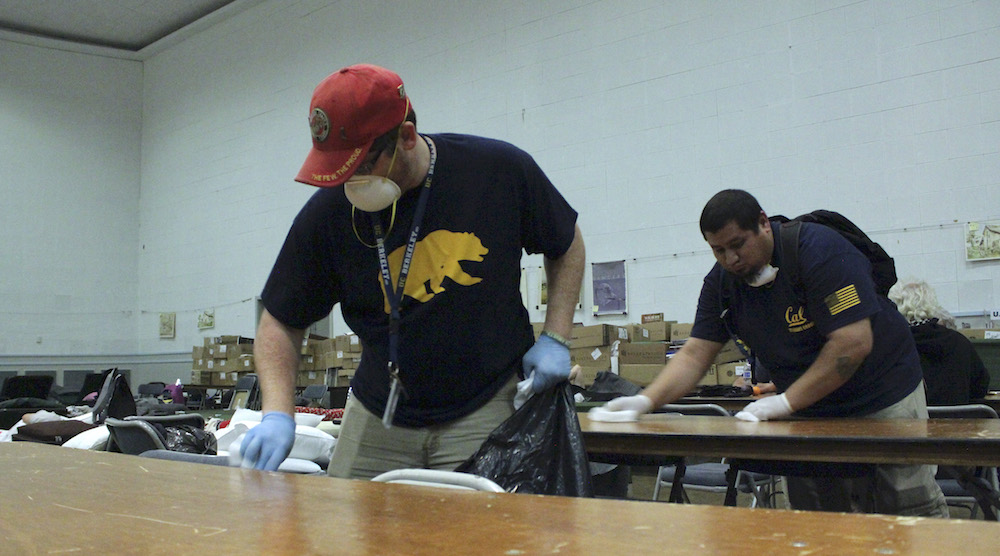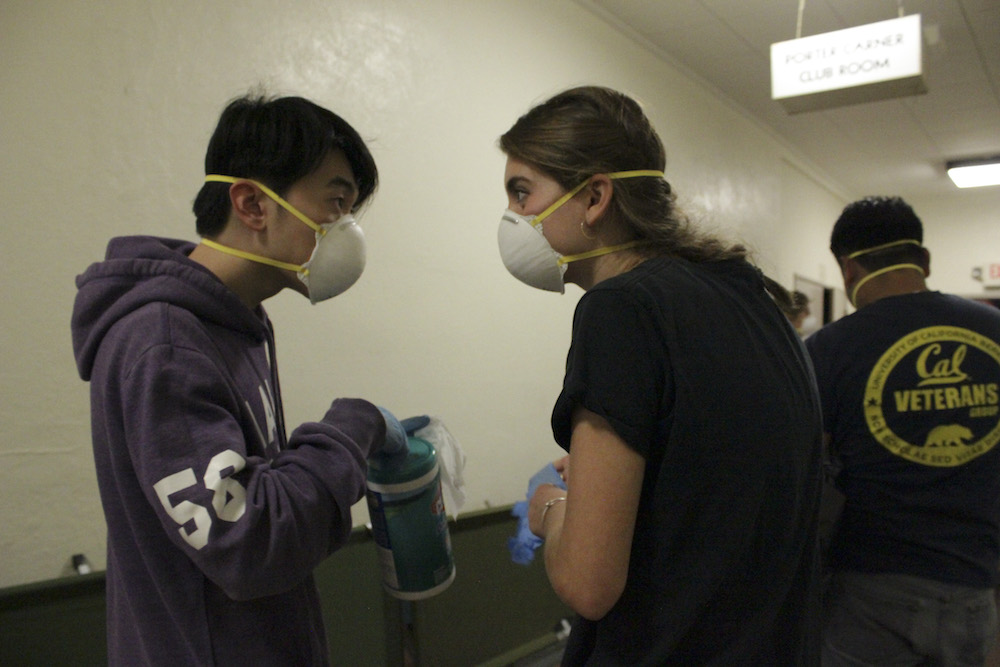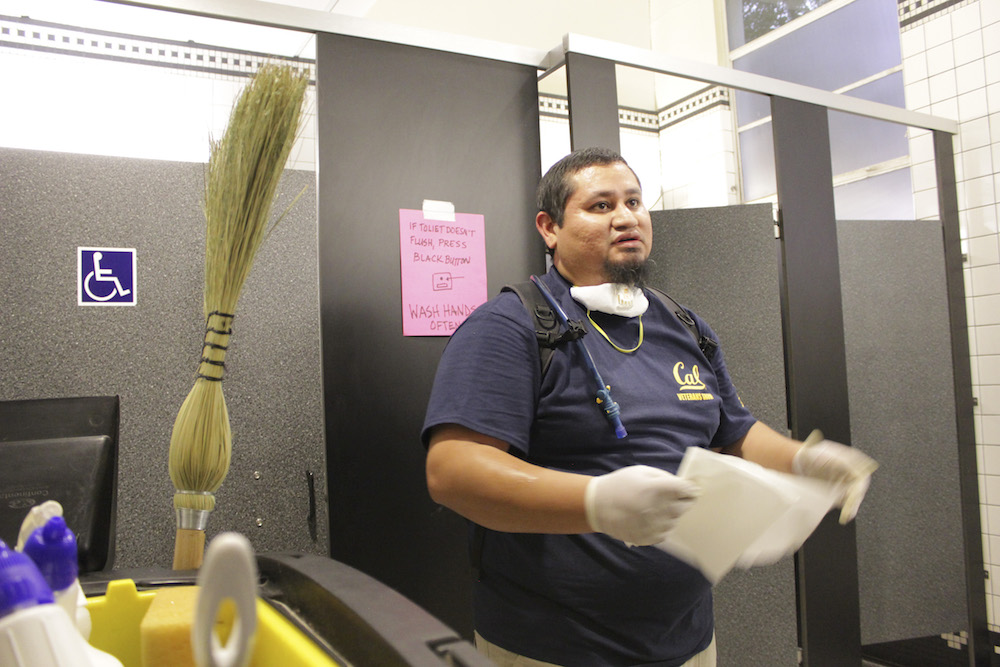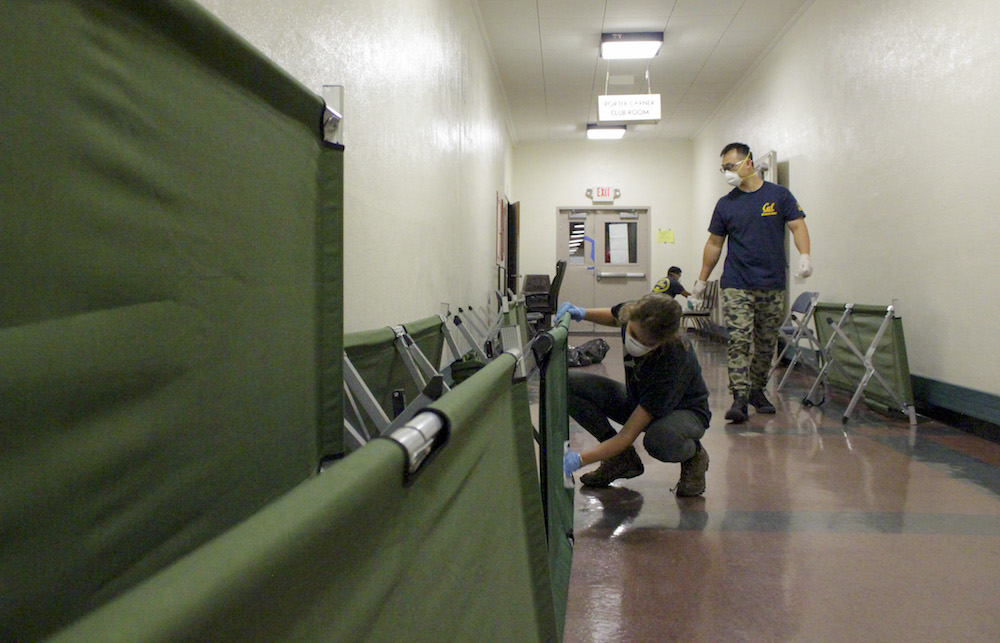Berkeley students, alums take on ‘back-breaking’ work at wildfire evacuation center
In 12-hour shifts, student veterans and public health graduate students have taken up the grimy, essential tasks
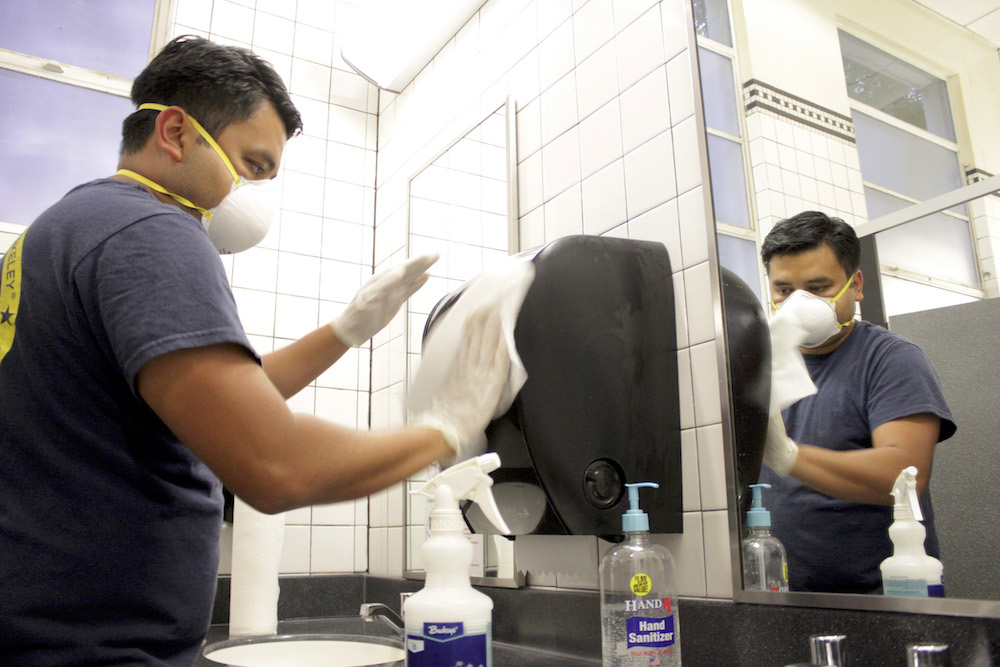
October 14, 2017

Shihong Xu, a UC Berkeley junior public health major, and Sarah Petnic, a 2017 graduate of the public health school, converse inside an evacuation center in Santa Rosa on Friday. (UC Berkeley photo by Jeremy Snowden)
Matthew Smith spent his Friday night cleaning a toilet at an evacuation center in Santa Rosa. It was the fourth time since Monday the UC Berkeley senior stayed up all night helping the hundreds of Sonoma County residents who fled the roaring wildfires that have destroyed thousands of buildings and killed 35.

The Facebook post UC Berkeley senior Matthew Smith used to find volunteers.
On Monday night, Smith, 33, drove to the Santa Rosa Veterans Memorial Building across from the Sonoma County Fairgrounds and started mopping floors, hauling garbage and talking with anyone who needed a sympathetic ear.
No one asked him. He just showed up. By his count he’s missed his mid-term, skipped a term paper and has spent some $750 of his own money to buy and donate flashlights and essential supplies from Target.
“I was there to do the stuff that no one else wanted to do, what needed to be done,” said Smith, a Marine Corps veteran who fought in Iraq. “I know I can work, I can clean. I know about social work. I’m a Marine. I know first aid and triage. I can deal with stress.”
At first it was just Smith driving to Santa Rosa each night, but by Friday he’d called in help: seven other UC Berkeley students, staffers and alumni, all with military experience or training in public health. They were just some of the UC Berkeley students who responded to the devastating fires; others have raised money on Sproul Plaza or opened their fraternity houses to evacuees.
Smith’s group worked for 12 hours, 4 p.m. To 4 a.m., Friday to Saturday, cleaning, sanitizing, mopping and scrubbing the veterans building, normally empty but opened up this week as a shelter for fire evacuees. Around them doctors, nurses and Red Cross volunteers administered medication, served meals and helped people who had lost everything start to piece together their lives.
“It is things like fires that we don’t expect to be part of an infectious disease outbreak,” Allie Jones, who is getting her master’s in public health, said as she sanitized door knobs in a busy hallway. “With all the different tragedies that can happen, this is something I can make a small difference on.”
Jay Kahn, a Kaiser respiratory therapist who had treated patients at the shelter since Tuesday evening, said having the volunteers do the basic work of keeping the area clean and organized helped him focus on patient care.
“These guys are the diesel fuel that has made this place go, and they have proved to be the backbone so we can give people the care they need,” Kahn said. “What they go around and say is, ‘How can we help you?’ and they solve problems.”

Cris Gomez, a UC Berkeley graduate and campus counselor, listens to instructions on how to clean the bathroom while volunteering at a shelter in Santa Rosa on Friday. (UC Berkeley photo by Jeremy Snowden)
Throughout the night, the group set up an air purifier, cleaned up messes in bathrooms, wiped down every table in the dining room, sanitized dozens of cots and talked with evacuees about their courses at Berkeley, the football game against Washington State or life in the Bay Area.
“You came all the way from Berkeley to help us?” one woman said as she saw the group in blue-and-gold t-shirts. “I can’t believe it. Thank you.”
Jose Ramos Mora, a senior business administration major, said he didn’t hesitate for a moment when Smith asked him on Facebook to come help with the unglamorous work, “you don’t see on ‘Scrubs.'”
“It has to get done,” said Ramos Mora, who was a corporal in the Marines from 2005 to 2010. “It is just like the Marine Corps. Everybody has a job to do. As meaningless as it might seem, it is part of a bigger picture.”

The group of UC Berkeley graduates, students and staffers carry an air purifier into an evacuation center in Santa Rosa on Friday. (UC Berkeley photo by Jeremy Snowden)
Sarah Petnic, who graduated from Berkeley in May with a master’s in public health said she was eager to help and put the theory of her degree into practice. “I’m thinking about things like ‘high-touch spots,'” she said as she scrubbed the backs of chairs in a dining room. “I’m trying to be systematic about it.”
Petnic, Smith and others said they planned to return for another 12-hours shift Saturday night, and maybe Sunday night as well.
“I got a lot of help when I was in the Army, and so I wanted to help people, I wanted to return the favor,” said Shihong Xu, a 28-year-old junior transfer studying public health. “What we did here is important for public health.”

A group of Cal students, graduates and staff wait outside an evacuation center in Santa Rosa on Friday. (UC Berkeley photo by Jeremy Snowden)
Told of the group’s work, Chancellor Carol Christ said she was “deeply moved by the generosity of these students, staff and alumni. Their commitment to helping others is what makes UC Berkeley special, and is an inspiration to all of us on campus.”
Smith, a social welfare major, said that spending so many hours with the evacuees had helped him think more about how the government should respond to immense natural disasters.
“We honestly need a corps of disaster-trained social workers and counselors, ready to quickly respond,” he said. “We have doctors, we have firefighters, we have police officers, but we need people who can listen. So many people wanted and needed to talk. That’s what they need.”
Still, Smith said, a group of strangers didn’t do a bad job.
“When it all broke down, society came together,” he said.
Contact Will Kane at [email protected]
